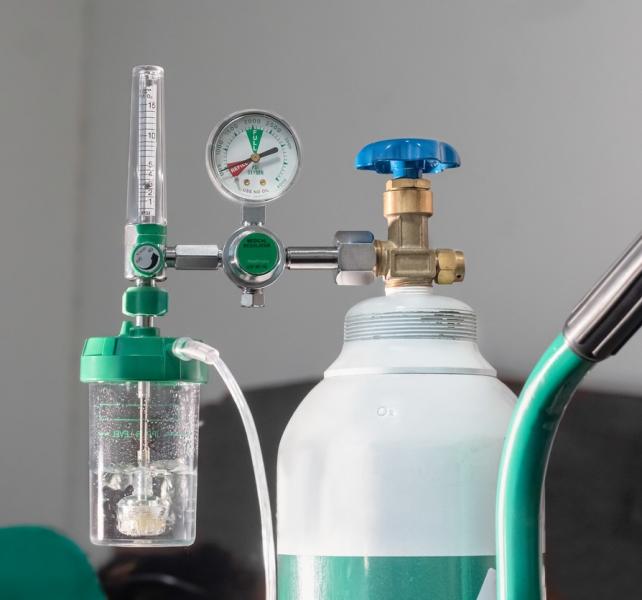Despite indicators such as a shortage of medical oxygen in public hospitals, the government denies that Covid-19 is stretching the health system.
On 18 January, the Procurement Regulatory Authority of Zimbabwe (PRAZ) closed a tender it flighted a week earlier for the supply of oxygen, fixing broken down machinery such as ventilators and supply of the same.
The tender also requested those interested in “commissioning of oxygen reticulation, negative air and bulk oxygen tanks at health facilities.”
This was in response to high demand for medical oxygen as the second wave of Covid-19 infections is different from the first wave which saw a majority of those infected exhibiting mild symptoms.
Medical oxygen suppliers that spoke to CITE said they charge US$2000 at least for oxygen concentrators.
Private hospital admission fees for Covid-19 patients range from at least US$5000 per bed up to stable recovery.
With demand up, prices are moving northwards, a sign that there’s limited supply.
To put it into perspective government workers earn an average of US$150 per month as such the majority can’t afford steep fees for medical oxygen at private facilities so they flock to public facilities which are under strain.
Doctors who spoke to CITE on condition of anonymity said pharmacies do not sell medical oxygen but registered suppliers only sell to people on prescription from doctors. Only hospitals can buy in bulk from suppliers.
However, because of the recent spike in demand, there’s a black-market on the rise.
“We don’t know where these people source their oxygen from but I would like to advise the public that it’s dangerous to buy without a prescription and from the black-market. One of the reasons is that oxygen used in wrong quantities could be deadly because if it’s too high or low it becomes fatal.
“Another push factor to black market deals is that people prefer self-managing at home because of the dire situation in hospitals,” said a doctor.
According to the World Health Organisation (WHO) patients suffering from COVID-19 and pneumonia—as well as those giving birth and undergoing routine surgery—can experience oxygen deficiency without knowing it.
When they are deprived of oxygen and doctors are unaware of the problem, treatable conditions get unnecessarily dangerous.
On 18 January the number of Covid-19 deaths reached 60 in one day meaning 2,5 deaths per hour.
Sources from the Ministry of Health and Child Care said a majority of the deaths occur in health institutions where patients are given oxygen and ventilator assistance to breathe.
“It’s bad. In early January we went for some time without medical oxygen. Most patients we attend to have breathing difficulties and that’s a Covid-19 doctor, nurse and patient’s biggest nightmare,” said a nurse from the United Bulawayo Hospitals (UBH).
During the same period, Zimbabweans took to social media offering money to anyone who could lead them to a bed with a ventilator and oxygen, a sign that a surge in cases was a strain on the health sector.
One open survivor thanks to access to a ventilator and oxygen is Kuda Musasiwa, a prominent Harare businessman.
Musasiwa spent almost a month in hospital and the majority of that time under oxygen. He said his survival was nothing short of a miracle.
“My organs shut down. My oxygen was below 68%,” he said.
But national Covid-19 national coordinator Dr Agnes Mahomva told CITE that between 2 – 5% of Covid-19 patients require a ventilator.
She said “the numbers are not bad” suggesting that the oxygen situation is under control- but many don’t buy into that story.
Hence, the government stands accused of hiding details around the gravity of Covid-19 in the country.
Last week Vice President Constantino Chiwenga who also doubles up as Health and Childcare minister refuted an earlier government position that Covid-19 was “overrunning” it.
“Admittedly, the recent escalation of cases of the pandemic in the country caused a high demand for health care. Nonetheless, let me reassure citizens that Zimbabwe’s public and private health institutions still have adequate capacity to offer health services to all patients,” he said in a statement.
Media Institute of Southern Africa (MISA) has filed a lawsuit against the government’s information gap.
In its application, MISA Zimbabwe says the information and reportage being disseminated on the current public health situation in the country is incomplete, uninformative, and inadequate.
“In that regard, MISA Zimbabwe contends the current information fails to take into consideration the requirements of all citizens in Zimbabwe,” Misa said about its urgent court action.
MISA added: “The quality of information being disseminated is poor and shortchanging the citizens as no information has been disseminated on the new strain of COVID-19.”
Medical oxygen suppliers who spoke to CITE indicated that medical oxygen has a minimum of 82% pure oxygen free from any contamination and is generated by an oil-free compressor.
Suppliers such as BOC Gases say they are supplying 70 tonnes a week, a rise from 50 tonnes last year signalling a 40% jump.
Acting Provincial Medical Director for Bulawayo Dr Welcome Mlilo said the region received supplies last week from BOC Gases.
“We took deliveries last week I think they will last us for some time,” he said.
Data drawn from World Integrated Trade Solution (WITS), a United Nations Conference on Trade and Development (UNCTAD) and International Trade Center, United Nations Statistical Division (UNSD) and the World Trade Organization (WTO) tracking system says in 2019 Zimbabwe imported 630,389 m³ (cubic meters) of medical oxygen.
With more suppliers giving precedence to medical oxygen, Liquefied Petroleum (LP) gas for home use is now in short supply and as such its retail price has gone as high as US$1,80 from a standard US$1.20.

